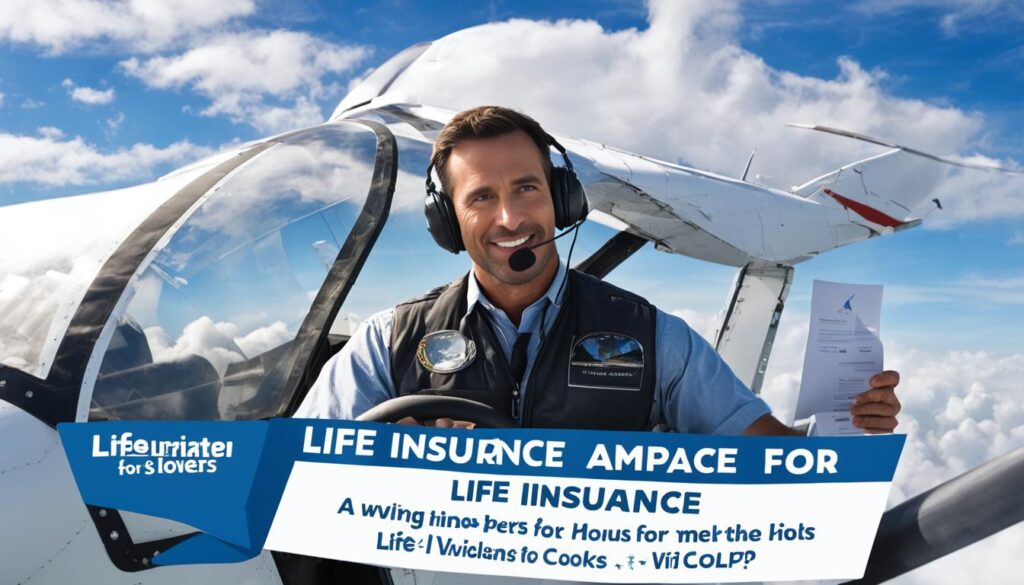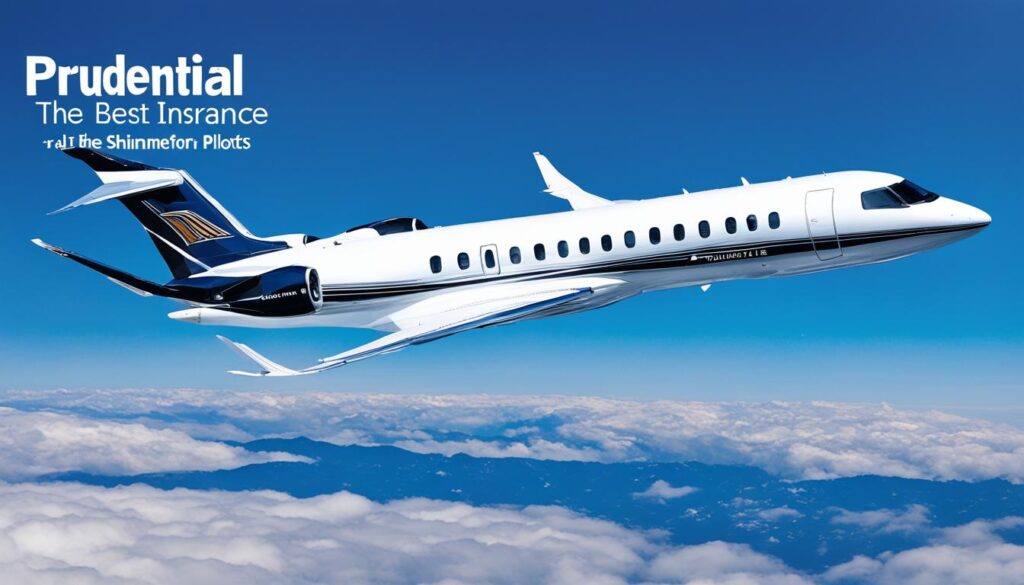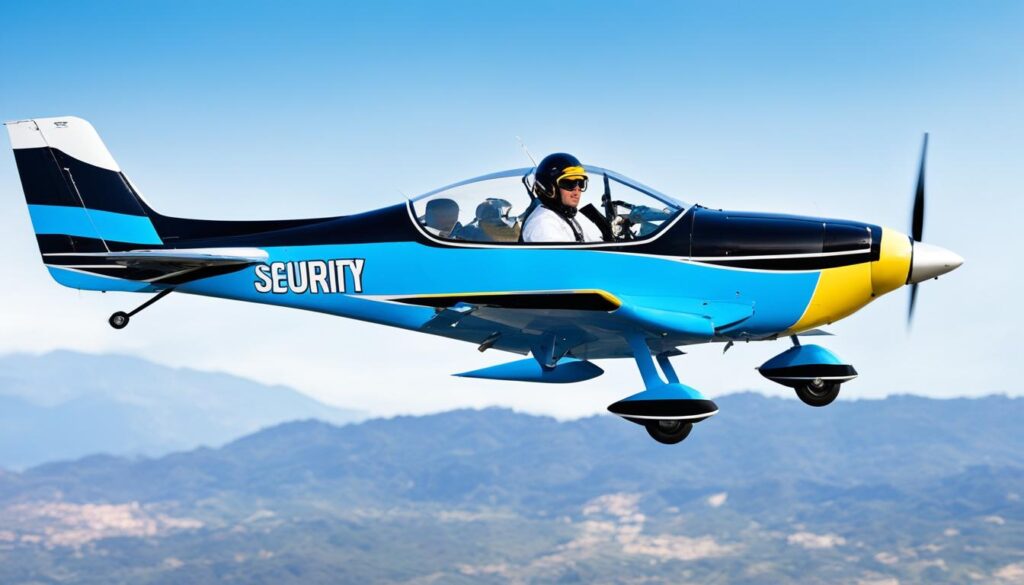As a pilot, you understand the thrill and freedom that comes with taking to the skies. But have you considered the unique benefits of having life insurance specifically tailored to your profession? Life insurance for pilots offers coverage options that address your specific needs and provide financial security for your loved ones in the event of an unforeseen accident or tragedy.
Flying as a hobbyist or private pilot can sometimes make it more challenging to find affordable coverage, but it is still worthwhile to protect your loved ones, especially if you have dependents or debts. Insurance companies recognize the perceived risk associated with flying for private pilots and may charge higher premiums. On the other hand, commercial pilots may have better rates due to their professional training and experience.
When applying for life insurance as a pilot, you will be asked specific questions about your flying experience and history. Insurance providers take these factors into account to determine your rates and coverage options. It is crucial to compare different insurance companies to find the best coverage for your individual needs.
Key Takeaways:
- Life insurance for pilots is essential for protecting the financial security of their loved ones.
- Pilots have unique needs when it comes to life insurance coverage options.
- Private pilots may face higher premiums, while commercial pilots may have better rates.
- Insurance companies may offer aviation exclusion riders that exclude flying-related deaths from coverage.
- Comparing different insurance companies is crucial to finding the best coverage for individual needs.
How Being a Private Pilot Affects Life Insurance Rates
When it comes to life insurance rates, being a private pilot can have an impact. Insurance companies take several factors into consideration when determining premiums, including your flying experience and the amount of coverage you purchase.
Some insurance companies charge a flat fee on top of your premiums based on the coverage amount you choose. This fee typically ranges from $2 to $5 per every $1,000 of coverage. It’s important to keep this additional cost in mind when budgeting for life insurance as a private pilot.
Your flying experience also plays a role in determining your life insurance rates. Less experienced pilots may face higher premiums due to the perceived risk associated with their limited flying hours. If you have less than 100 hours of solo flying experience, it is recommended to wait before applying for a policy.
It’s essential to compare rates from different insurance companies to find the best and most affordable coverage options for private pilots.
Example Quote:
“As a private pilot, I discovered that my life insurance rates were higher than expected. The insurance company charged an additional flat fee for every $1,000 of coverage I purchased. I also learned that my limited flying experience contributed to the overall premium increase. It was crucial for me to do thorough research and compare rates from various insurance providers to find the best policy that suits my needs.” – John Smith, private pilot
| Factors Affecting Rates for Private Pilots | Impact on Life Insurance Rates |
|---|---|
| Flying Experience | Less experience may lead to higher premiums |
| Coverage Amount | Insurance companies may charge a flat fee based on coverage |
| Pilot’s Age | Age can influence overall premium costs |
Life Insurance for Commercial Pilots
Commercial pilots have unique considerations when it comes to life insurance. Fortunately, they may have access to better rates compared to private pilots. While rates for commercial pilots still depend on factors such as age and flying experience, the chances of finding affordable coverage are higher.
One key advantage for commercial pilots is the availability of insurance companies that offer aviation exclusion riders. These riders exclude flying-related deaths from coverage, resulting in more tailored and cost-effective policies. By excluding flying-related risks, insurance companies can offer better rates to commercial pilots.
When seeking life insurance as a commercial pilot, it is crucial to consider individual needs and compare different insurance companies. Factors such as coverage options, premiums, and policy terms should be thoroughly evaluated to ensure the best coverage. Additionally, working with a licensed insurance agent or broker who understands the unique requirements of commercial pilots can provide valuable guidance throughout the process.
Overall, commercial pilots have the opportunity to secure affordable life insurance coverage by leveraging their profession and exploring insurers that specialize in their needs. With better rates and aviation exclusion riders, commercial pilots can protect their financial future and provide peace of mind for their loved ones.
How to Get Life Insurance as a Private Pilot
Getting life insurance as a private pilot follows a similar process to getting life insurance in any other profession or hobby. However, there are specific questions about flying that you will need to answer when applying for life insurance with a private pilot’s license.
Underwriting Guidelines:
- Type of flying: You will be asked to provide information about the type of flying you do, whether it’s recreational, private, or commercial.
- Flight hours: The insurance company will want to know your total flight hours to assess your level of experience.
- Aviation accidents or violations: Any past accidents or violations related to aviation will be taken into consideration during the underwriting process.
- License and aircraft type: You will be required to provide details about your license, including its type and any additional ratings or certifications. Additionally, you may need to specify the type of aircraft you fly.
Your answers to these questions will directly impact your rates and the availability of coverage. It is crucial to be honest and thorough when providing this information to ensure accurate underwriting.
When applying for life insurance as a private pilot, it is advisable to work with an experienced insurance agent or broker who understands the unique needs of pilots. They can guide you through the application process, help you compare different insurance companies, and find the best coverage options that suit your individual requirements.
| Key Factors | Action Steps |
|---|---|
| 1. Provide accurate information | Answer all questions truthfully and in detail to ensure accurate underwriting. |
| 2. Work with an insurance agent | Seek the assistance of a licensed insurance agent or broker who specializes in serving pilots to navigate the application process effectively. |
| 3. Compare insurance companies | Shop around and compare quotes from different insurance companies to find the best coverage options and rates for your specific needs. |
| 4. Understand policy exclusions | Review the terms and conditions of the policy carefully, paying attention to any aviation-related exclusions or limitations. |
Remember, life insurance as a private pilot is essential for safeguarding the financial security of your loved ones. By following the application process and underwriting guidelines, you can obtain the coverage you need to ensure peace of mind both in and out of the cockpit.

Best Life Insurance Companies for Private Pilots
When looking for life insurance as a private pilot, it is important to find a company that offers tailored coverage for pilots. The best life insurance companies for private pilots are those that have lenient underwriting guidelines and offer competitive rates. Factors such as health, age, family medical history, budget, and coverage needs should be considered when choosing a life insurance company. It is recommended to work with a licensed insurance agent or broker who can help you navigate the options and find the best coverage for your needs.
Here are some of the best life insurance companies for private pilots:
| Company | Tailored Coverage | Lenient Underwriting Guidelines | Competitive Rates |
|---|---|---|---|
| Prudential | Yes | Yes | Yes |
| Protective | Yes | Yes | Yes |
| Legal & General America | Yes | Yes | Yes |
These three companies have established themselves as top choices for private pilots seeking life insurance coverage. They understand the unique needs of pilots and offer tailored coverage options to suit individual circumstances.
Prudential, for example, offers competitive rates and does not require an aviation exclusion rider, making it an attractive choice for private pilots. Protective, on the other hand, provides coverage to student pilots without requiring an extra fee, which is beneficial for those who are still in training. Legal & General America offers some of the cheapest rates for private pilots and does not necessarily require an aviation exclusion rider for affordable coverage.
When choosing a life insurance company, it is crucial to consider not only the tailored coverage options but also the leniency of underwriting guidelines and competitive rates. Working with a licensed insurance agent or broker can help pilots navigate the options and find the best policy that aligns with their specific needs.
Best Term Life Insurance for Private Pilots: Prudential
When it comes to life insurance coverage for private pilots, Prudential is a standout option. Prudential is recognized as one of the best life insurance companies for private pilots seeking term life insurance coverage. With affordable rates and comprehensive policies, Prudential understands the unique needs of pilots and tailors its offerings accordingly.
One of the standout features of Prudential’s term life insurance policies for private pilots is the absence of an aviation exclusion rider. Unlike some insurance companies that may impose additional restrictions or exclusions on coverage for aviation-related activities, Prudential provides comprehensive coverage without such limitations.

To qualify for the best rates offered by Prudential, private pilots typically need to meet certain criteria. This includes a requirement of at least 1,000 hours or five years of experience as a certified pilot. Additionally, pilots should have a minimum of 100 hours in their current aircraft and be at least 30 years old. Meeting these criteria demonstrates a level of experience and stability that may result in more affordable rates and better coverage options.
Term life insurance is an attractive option for many private pilots due to its affordability and flexibility. This type of coverage provides protection during the prime earning years of the insured, covering a specific term, such as 10, 20, or 30 years. Prudential offers competitive rates for term life insurance, making it a cost-effective solution for pilots looking to safeguard their loved ones’ financial security.
Best Life Insurance for Student Pilots: Protective
When it comes to life insurance for student pilots, Protective is the top choice. What sets Protective apart from other insurance companies is that they offer coverage for student pilots without any extra fees. This means that student pilots can protect their financial future without any additional burden on their budget.
While rates for student pilots may be higher compared to more experienced pilots, Protective still offers affordable options. They understand the unique needs of student pilots and have tailored their coverage to meet those needs.
It’s important for student pilots to carefully consider their coverage needs and work with an insurance agent or broker to find the best policy. By exploring the options offered by Protective, student pilots can ensure that they have the necessary protection in place, allowing them to focus on their training and future career as a pilot.
Protective is committed to providing reliable and comprehensive life insurance coverage for student pilots, helping them achieve financial security while pursuing their dreams of becoming professional pilots.

Cheapest Life Insurance for Private Pilots: Legal & General America
When it comes to finding affordable life insurance for private pilots, Legal & General America is a top choice. Legal & General America, also known as Banner Life and William Penn in some states, offers some of the cheapest rates for private pilots.
While some insurance companies may require an aviation exclusion rider to lower premiums, Legal & General America offers affordable coverage without the need for this additional rider. This means that private pilots can obtain cheap life insurance without compromising on the coverage they need.
Pilots with at least 100 hours of solo flying experience or who fly less than 250 hours annually may qualify for Legal & General America’s standard rates. This makes it easier for private pilots to secure affordable life insurance without facing inflated premiums.
Also Read:- Navigating Life’s Journey With Continental Life Insurance
To help private pilots make an informed decision, it is recommended to compare rates and coverage options from different insurance companies. By doing so, pilots can ensure they find the most affordable life insurance policy that meets their individual needs.
Protect your loved ones and secure your financial future with Legal & General America’s cheap life insurance for private pilots.

| Benefits of Legal & General America’s Life Insurance for Private Pilots |
|---|
| 1. Cheap rates for private pilots |
| 2. No need for aviation exclusion rider |
| 3. Standard rates for pilots with 100+ hours of solo flying experience or who fly less than 250 hours annually |
| 4. Customizable coverage options to meet individual needs |
Conclusion
Life insurance for pilots is crucial for safeguarding the financial well-being of their loved ones. Whether you are a private pilot or a commercial pilot, understanding your unique needs is vital when it comes to finding the right coverage. Comparing rates and exploring coverage options from different insurance companies is essential to secure a policy that suits your individual requirements.
When navigating the world of life insurance for pilots, it is beneficial to work with a licensed insurance agent or broker. These professionals can provide expert guidance throughout the process, ensuring you have the necessary information to make informed decisions. By partnering with an agent or broker, you can locate the ideal coverage that offers competitive rates.
Remember, life insurance is a critical investment for pilots. By considering your unique needs and exploring coverage options, you can protect the financial future of your dependents. Take the time to compare rates and policies from various insurance providers to find the best life insurance policy for pilots.
FAQs
Q: What are the unique benefits of life insurance for pilots?
A: Life insurance for pilots offers tailored benefits and coverage options to protect their loved ones financially in the event of their death.
Q: How does being a private pilot affect life insurance rates?
A: Being a private pilot can impact life insurance rates. Some insurance companies charge a flat fee based on the amount of coverage, and rates may be higher for less experienced pilots.
Q: What is life insurance for commercial pilots?
A: Life insurance for commercial pilots offers better rates compared to private pilots. However, rates still depend on factors such as age, flying experience, and individual needs.
Q: What is the process of getting life insurance as a private pilot?
A: To get life insurance as a private pilot, you need to go through the standard application process and answer specific questions about your flying experience, hours, accidents or violations, and license and aircraft type.
Q: Which are the best life insurance companies for private pilots?
A: The best life insurance companies for private pilots are those that offer tailored coverage, have lenient underwriting guidelines, and provide competitive rates.
Q: What is the best term life insurance option for private pilots?
A: Prudential is recognized as one of the best life insurance companies for private pilots seeking term life insurance coverage, offering affordable rates without requiring an aviation exclusion rider.
Q: What is the best life insurance option for student pilots?
A: Protective is a top choice for student pilots seeking life insurance coverage. They offer affordable options without requiring an extra fee.
Q: Which is the cheapest life insurance option for private pilots?
A: Legal & General America, also known as Banner Life and William Penn in some states, offers some of the cheapest rates for private pilots, and an aviation exclusion rider is not necessary to obtain affordable coverage.
Q: What should pilots consider when looking for life insurance coverage?
A: Pilots should consider their individual needs, compare rates and coverage options from different insurance companies, and work with a licensed insurance agent or broker to find the best policy.
Q: What are the unique benefits of life insurance for pilots?
A: Life insurance for pilots offers specific coverage to address the unique risks associated with aviation, such as aviation exclusions and coverage for pilots with private or commercial licenses.
Q: How does being a pilot affect the availability of insurance?
A: Being a pilot can affect the availability of insurance due to the inherent risks associated with aviation. However, there are insurance products specifically tailored for pilots that offer coverage at competitive rates.
Q: What should pilots consider when looking for affordable life insurance?
A: Pilots should consider insurance agencies that specialize in providing coverage for aviators. They also need to ensure that the policies they are considering do not have extensive aviation exclusions and offer competitive premiums.
Q: Are there specific exclusions pilots need to be aware of when obtaining life insurance?
A: Yes, pilots need to be aware of aviation exclusions that some insurance companies impose. These exclusions may limit the coverage for aviation-related incidents, and it’s crucial for pilots to understand these limitations before selecting a policy.
Q: What are the advantages of whole life insurance for pilots?
A: Whole life insurance provides a lifetime coverage and can build cash value over time, offering pilots a comprehensive solution for their long-term insurance needs.
Q: Are there specific life insurance plans tailored for commercial and private pilots?
A: Yes, there are insurance products designed specifically for commercial and private pilots, taking into account the unique risks and needs associated with their professions.
Q: How can pilots find the best rates for life insurance?
A: Pilots can find the best rates by working with a licensed life insurance agent who has expertise in underwriting for aviation-related risks and by exploring offerings from top-rated life insurance companies that understand aviation exposures.
Q: What is a return of premium in the context of life insurance for pilots?
A: A return of premium feature in life insurance entitles the policyholder to receive a refund of the premiums paid if the policy matures and the insured is still alive. It can be a valuable option for pilots looking for a term life insurance policy with added benefits.
Q: What is an aviation exclusion rider in pilot insurance?
A: An aviation exclusion rider is a provision in pilot insurance that specifies limitations or restrictions on coverage related to aviation activities. Pilots should carefully review and understand these exclusions when selecting a policy.
Q: Why is it recommended that pilots find life insurance through a pilot insurance center?
A: It is recommended that pilots use a pilot insurance center because it provides access to insurance agencies and agents with specialized expertise in underwriting for aviation-related risks. This can significantly help in finding the most suitable coverage for pilots.



